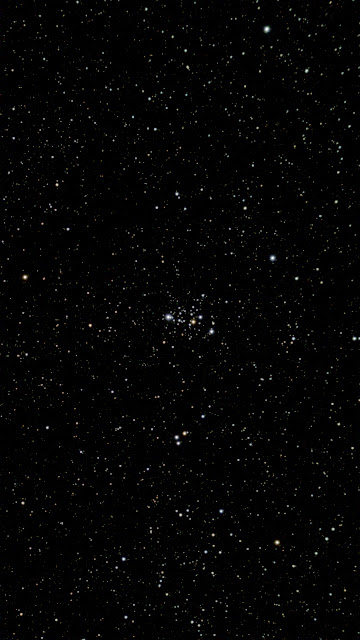Collecting Messier Objects
My ongoing quest to get Seestar images of all Messier objects took a big step forward recently. Every October seems to include a period of clear sky and mild autumn temperature, a welcome relief from months of steamy, cloudy summer nights. On October 5th there were no clouds, little moonlight, and only a couple temporary neighbor lights to interfere. I captured a good number of Messier star clusters to add to my collection.
Some open clusters are very pretty like M52 in Cassiopeia shown in the first image below, a 5-minute exposure. Note the small bit of red nebulosity at the top. This is the edge of the Bubble Nebula, NGC7635.
Another beautiful cluster in Cassiopeia is M103 shown next in a 3-minute exposure. Star colors here aren't as dramatically evident as I'd like. I don't know how to solve this color problem.
Probably the most famous open cluster of all is the Pleiades in the constellation, Taurus. A 20-minute exposure revealed some of the white reflection nebula lit by cluster stars. When I captured the next image the Pleiades happened to be oriented in just the right way to fall almost entirely within Seestar's limited field of view. This was a happy surprise!
The Messier catalog contains a couple of oddball members like the asterism M73 in Aquarius shown in the next 2-minute exposure. Perhaps the small group of four stars seemed like a fuzzy object in Messier's telescope?
There are A LOT of globular clusters in the Messier catalog including a number of small unimpressive ones. If you've seen one of these unimpressive globulars, you've seen them all. So I'm not displaying all the globulars I captured this night, only the next two. First is globular cluster M10 in Ophiuchus. It has a good sized diameter in the following 10-minute exposure.Globular cluster M30 in Capricornus appears smaller than M10. It has three short lines of stars pointing nearly towards its center. Each stellar line consists of three equally bright stars. These distinctive lines are visible in the next 10-minute exposure when you click on the image to view it at full size.
It took a 30-minute exposure to show inner parts of face-on spiral galaxy M74 in Pisces shown next.
Finally, I attempted to capture a portion of the Heart Nebula, IC1805, in Cassiopeia. The entire nebula is too large to fit within Seestar's field of view, so I tried to include just the brightest portion. Even so, red nebulosity is barely visible in the next 30-minute exposure. Perhaps more would show up in darker skies and longer exposures.I learned a valuable lesson during this Seestar session. Anticipating a long night, I used a charger cable and extension cord plugged into Seestar to keep the battery fully charged. I control Seestar from inside my house and was so lulled into indoor comfort I didn't check the cord status as I should have. After some time I noticed battery charge declining instead of remaining steady. When I went outside to see what was wrong I found the charging cord wrapped around Seestar several times like a boa constrictor! Fortunately, Seestar hadn't tipped over, but increasing cable tension had eventually broken the cord's USB connector and pulled it out of Seestar's USB port. I'll never make this mistake again! Seestar completes several complete rotations during a long night finding targets all over the sky. In the future I need to check outside more often.
I've now imaged 60 of the 110 Messier objects. As the October clear period continues I hope to increase the collection and post more images soon.










No comments:
Post a Comment